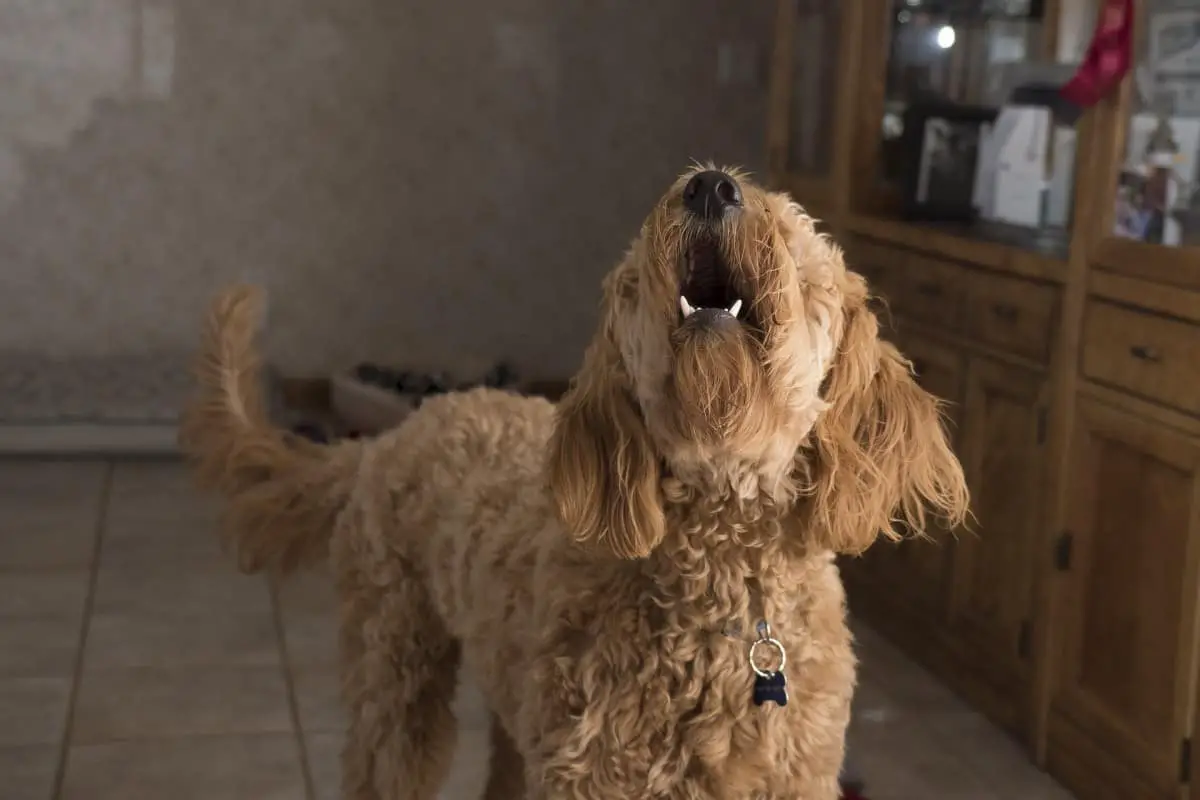This post contains affiliate links.
Dogs bark for a variety of reasons that include wanting something, being hungry, or someone being too close to their house. When it comes to food, dogs generally bark to let you know he is hungry, but it is rare that he will bark at their food. Why does your dog bark at their food, then?
There is very little information about why your dog barks at their food. The key lies in observing their behavior to figure out the trigger, which could be because of new food, new bowls, or painful teeth.
In this article, we are going to cover why dogs bark at their food, including teeth issues and new food issues. Next, we will go over what you can do to make your dog stop barking at food, such as training techniques like commands and observing behavior triggers.
Table of Contents
Reasons Dogs Bark at Food
There are many reasons why your dog might be barking at his food. As it is an unusual behavior and one that hasn’t been studied in depth, the reasons are limited. A few of those reasons include:
- Change in food. Dogs are creatures of habit. He likes to keep his schedules regular, and when things change, He doesn’t usually respond well to it. The same goes for his food. When you change your dog’s food, he may express his displeasure and anxiety by barking at it.
- New food bowls. When your dog enjoys eating and the food he eats, your dog will eat up his food quickly. If you change his bowls and give him new ones, you may notice that your dog has started barking at the food. It isn’t the food your dog is barking at; it’s the new bowls.
- Painful teeth. If your dog is experiencing any discomfort in his teeth, he will exhibit this by barking whenever he needs to use them. A toothache will appear as aggression in an animal who cannot communicate with you that there is an issue. He wants to eat, but eating is hurting him, so he barks at his food.
You aren’t necessarily going to find the root cause of your dog barking at his food. You may find the behavior weird and unnerving because their food is right in front of them; why bark instead of eating?
There is little research into the psychology of dogs barking at food, so you might be on your own if any of the above issues don’t help you. However, not all hope is lost. There are steps you can take to both understand and change the behavior your dog is exhibiting.
How to Make Your Dog Stop Barking at His Food
It is relatively unusual that your dog will bark at his food. There is minimal information on what the root cause of this behavior might be. However, just because it is unusual does not mean you won’t find out the cause or the solution. Be diligent in finding out the cause of your dog’s distress. He will thank you for it with love and loyalty.
The first thing you want to do is to observe your dog. Ask yourself various questions while observing the attitude of your dog. Is the barking at food new? Did you change anything that could cause your dog to act this way? Is the barking related to being startled or another controllable factor?
Above, it was mentioned that changes in bowls or foods could cause this aggressive behavior as your dog learns to adapt to the changes. However, other changes include something that has nothing to do with the food or the bowl:
- Did you get another dog? A bigger dog? A smaller one?
- Have you recently moved to a new and larger home? Are the surroundings new?
- Did you get another animal that roams the house like a cat?
Any of those changes can lead your dog to be protective of his food, and barking at it signifies that he is claiming the food as his. Other things to pay attention to in your observations can include if your dog sees himself in the reflection of the bowls or if his collar tag is hitting the bowl. Each of these things can spook your dog, causing the barking that isn’t directed at the food at all.
Once you notice what happens just before your dog barks at his food, you can work to either remove the stimulus or change the behavior. There are various techniques you can use to help change your dog’s need to bark at his food.
Changing the Barking Behavior
Getting your dog to stop barking at his food can be a simple process. A bowl that shows a reflection can be wrapped in tape. Tags that hit the bowl can be removed or moved. If it’s a new pet in the home, be patient, because your dog is exhibiting dominance being the pet that was there first.
If you introduce a new food, it may take time for your dog to get used to it. Though this happens rarely, you may need to return to the original food. However, if you can’t find a root cause, you may need to take your dog to the vet to have his teeth checked. If the original food is no longer available, you will have to try different types of food until you find one, your dog is willing to eat with no fuss.
The Verdict: Dogs Bark at Food for Various Reasons, but You Can Stop the Behavior
Dogs bark at their food for all kinds of reasons. Sometimes it is as simple as a change that he needs to get used to. Other reasons can be physical like a sound, reflection, or even a toothache. Just because the behavior is new and happening does not mean that all hope is lost.
You may need to take some time to observe your dog and figure out what the root cause might be. The observations may take up to a few weeks for you to figure out why your dog is barking at his food. By paying close attention to what he is doing and when he is doing it, might help you narrow down the scope of why he is barking.
You can teach your dog to stop barking at his food, similar to any type of dog training. Offer a reward for good behavior. Sooner or later, your dog will catch on. You have to make sure that you are consistent with the training, or your dog may not grasp what you are trying to teach him.
Conclusion
Most times, dogs exhibit food aggressions because they are trying to let you and others know that their food is theirs. Additionally, new pets in the home might make your dog feel like his meal is threatened, and he is letting them know who the boss is.
Through basic training techniques, you will be able to slowly teach him that the behavior of food aggression is unacceptable.
Ensure that you have your dog checked at the vet to be sure that the cause isn’t physical before you begin trying to train your dog to stop the behavior. Sometimes his only communication regarding discomfort is by barking, and if eating hurts him, he needs to be able to let you know.
No matter what, your dog will eventually stop barking at his food. You do not need to live with that behavior forever.
Related Articles
- Is It Bad To Feed a Dog Late at Night? (We Find Out)
- 4 Reasons Why Your Dog Will Only Eat Late at Night
- Why Does Your Dog Leave Food Around the House? Here’s What to Do
Sources
- Wag Walking: Why Dogs Bark At Food
- The Pet Town: Why Dogs Bark At Food
- Dog Temperament: Why Dogs Bark At Food
- Sarah’s Dogs: Why Dogs Bark While Eating
- The Bark: Preventing Dog Aggression over Food
Mrdogfood.com is a participant in the Amazon Services LLC Associates Program, an affiliate advertising program designed to provide a means for sites to earn advertising fees by advertising and linking to Amazon.com. We also participate in other affiliate programs which compensate us for referring traffic.





